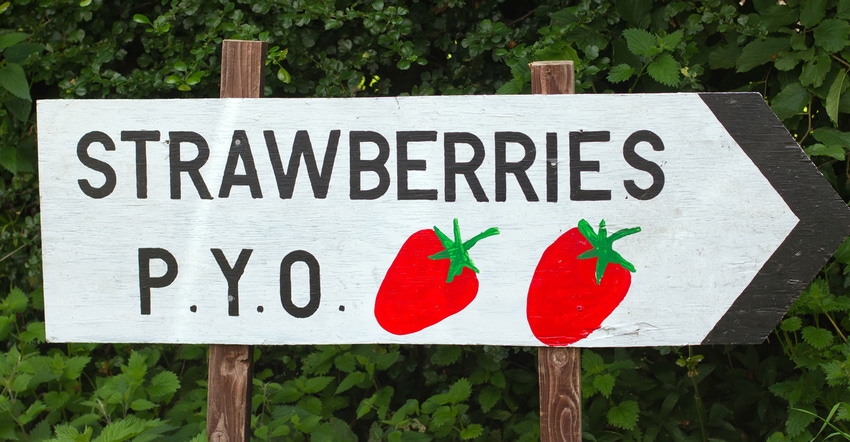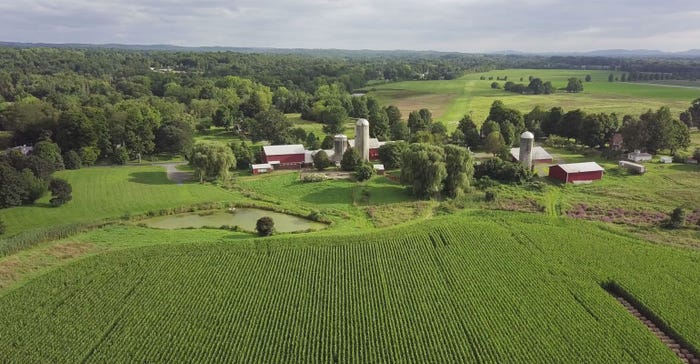
Norman Greig has 7 acres of asparagus that he has no idea how he will sell. It will be ready to harvest in the beginning of May; however, COVID-19 isolation means that his usual U-pick operation may not work this year.
“You cannot plan ahead,” he says. “We’ll make the best plan every day. If you’re talking about a month from now, we have no idea. This is all new territory. You get up in the morning and see what you can do to figure it out.”
Based in Red Hook in New York’s Hudson Valley, his Greig Farm operation draws half of its U-pick customers from New York City. He doesn’t anticipate any of them will come up to pick asparagus, strawberries, blueberries, blackberries, apples or pumpkins on his 120 acres this year.
Greig’s put up Plexiglas to limit interaction between his workers and visitors, and he’s also thinking of numbering rows to increase social distancing between pickers.
He’s thankful that his operation is set up for retail since the farm also operates a market. He has put everything online, something he’s never done before, and fills orders by asking customers to call when they arrive so employees can leave their boxed orders on a picnic table. He’s also started a delivery service.
 NEW TERRITORY: At the Greig Farm in New York’s Hudson Valley, owner Norman Greig says he’s trying to plan for a year with very few, if any, U-pick customers. So he’s instituted a curbside pickup program and has started a delivery service.
NEW TERRITORY: At the Greig Farm in New York’s Hudson Valley, owner Norman Greig says he’s trying to plan for a year with very few, if any, U-pick customers. So he’s instituted a curbside pickup program and has started a delivery service.

Greig says that he feels a bit uncomfortable with the lack of customer interaction, as it seems unfriendly, but he realizes that’s what must be done to keep customers safe.
“Revenue is up, but costs are up,” he says. “I’m not sure how it’s working out yet financially. This will go fine until someone here gets infected and we close. We’re fortunate each day, but I can’t recommend it as a way to live.”
Planning for a new normal
Brian Moyer, Extension program associate at Penn State, says the pandemic has turned everything he’s taught about direct marketing to customers on its head.
Instead of making farms more accessible for people to come out and have a “farm experience,” farmers now must think about being as accessible as they can while at the same time limiting interactions with their customers.
For pick-your-own farms, many of which have already started up in Maryland and Delaware or will open in May and June, Moyer says they should think of moving everything outside, including crating and payment.
Perhaps think about creating timeslots for customers to come in, he says, and providing more handwashing facilities and sanitizing stations.
“Also, consider that they may not come,” he says. “Just consider that they may be quite willing to preorder stuff and pick up or have that as an option.
“This is a whole new world. It’s the complete opposite of what we wanted people to do.”
Ed Weaver, owner of Weaver Orchards in Morgantown, Pa., says he’s changed his farm market to online ordering and curbside pickup only. Customers fill out an order form, email it to them and pick it up curbside. A full-scale online store is coming soon.
Weaver’s business has an extensive pick-your-own business that will be starting soon. He says that he’s planning changes, but it’s too early to say what those will be. NC State Extension has a guide on possible U-pick setups farms could use this season to minimize social interaction and increase safety.
Weaver says that most of his U-pick fields are close to parking areas, so that won’t require transporting people back and forth to the fields. But he does plan on doing some sort of social distancing in the fields, possibly assigning customers rows and limiting pickers to one family member at a time.
The hardest thing, he says, is having to limit interaction between his employees and customers.
Still, he sees the U-pick as an economic opportunity. As the weather gets warmer, people will want to be outside and many other entertainment options — amusement parks, pools, beaches — might have reduced hours this spring and summer or be closed altogether, so the farm could be a viable option for people who want something to do.
“They want to go out, they want to experience the outdoors. There is also an appreciation of local products again,” he says.
Open at a cost
At Fulkerson Winery and Farms in Dundee, N.Y., owner Sayre Fulkerson says that wine shipping has increased 800% since the outbreak, mostly to neighboring Pennsylvania where wine shops were closed for a period.
Although he has cut back on sales staff at the farm store, his clerical staff are plenty busy shipping bottles.
“The shipping cost, which we cover, eats into profits,” he says. “Revenue is down. It’s not business as usual, definitely.”
Eliminating wine tastings and adhering to travel restrictions have cut tourist traffic to the winery, which hurts sales.
The farm sells U-pick asparagus, blueberries, table grapes, wine grapes and peaches, but Fulkerson doesn’t anticipate any difficulty keeping customers separated since “they come in small groups or [alone],” he says. “People pick their own area and don’t wander around.”
He also sees more opportunity for farmers offering U-pick or direct-sale produce, as many people seek goods from places other than stores.
“People are more self-reliant, and the virus may make people think a little more about self-reliance,” he says. “It will be interesting to see if people pick their own fruit or make their own wine.”
Sergeant writes from central New York.
Read more about:
Covid 19About the Author(s)
You May Also Like






